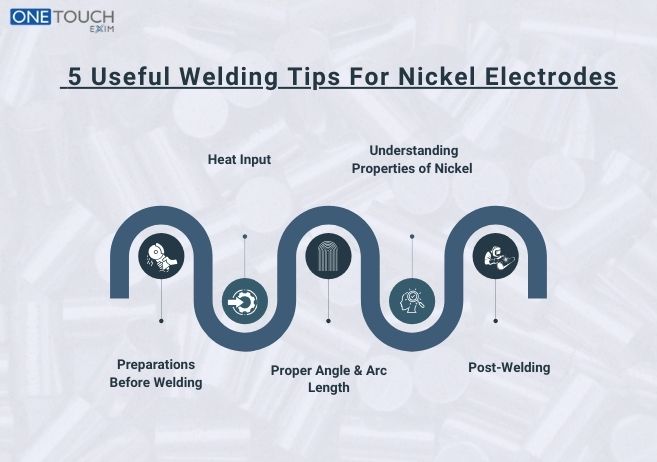Nickel is a metal, it is mainly known for its properties like corrosion-resistance, strength and durability. It is a strong metal and a good conductor of heat and electricity. There are many types of nickel electrodes and are used in various industries due to their uniqueness. For instance, they are used for welding different forms of cast iron.
Nickel compounds can be really toxic, so it is important to follow proper safety measures for working with nickel electrodes. In this article we will learn about welding tips and guidelines for nickel electrodes.
Properties of Nickel
Here some properties of nickel to have a better understanding. l
- Molecular Weight: 58.69 g/mol
- Heat of Fusion: 17.48 kJ/mol-1
- Melting Point: 1455 °C
- Boiling Point: 2732 °C
- Heat of Vaporization: 377.5 kJ/mol-1
- Density: 8.902 g/cm3
- Electrical Resistivity: 69.3 nm. (20 °C)
- Appearance: Lustrous silvery metal
- Electronegativity: 1.91 Pauling
Applications of Nickel Electrode
Here are few uses of nickel electrodes.
- Nickel electrodes are commonly used in the petrochemical industry because they have extremely high chemical attack resistance.
- They are used for welding and electroplating.
- Product 1112 is made for welding many nickel base alloys.
- Product 1127 is a Monel electrode which suitable for repairing chlorine environments.
- They are used to weld cast iron of different forms – malleable, ductile and grey.
- They are used as gas diffusion electrodes.
5 Useful Welding Tips For Nickel Electrodes
Welding nickel electrodes needs special technique and carefulness. Here are some useful tips that might help you while welding with nickel electrodes.
1. Preparations Before Welding
Always make sure that your base metal is free from contaminations like rust, oil and grease. You can use methods like wire brushing, chemical cleaning and grinding for cleaning it. For welding, generally pure argon shielding gas is recommended.
2. Heat Input
Nickel has the property of high thermal conductivity therefore the heat needs to be managed carefully otherwise, it can cause cracking and overheating of the electrode. It is advised to use lower amperage compared to steel welding.
3. Proper Angle and Arc Length
It is important to maintain proper angle for good fusion. The recommended angle for nickel welding is 15 degrees to 20 degrees. Also maintain a proper arc length to better penetration.
4. Understanding Properties of Nickel
It is very important to learn and understand the properties of nickel. It remains ductile and soft even after welding also it is corrosion-resistant.
5. Post-Welding
Some nickel alloys require post-weld treatments to improve their properties and to relieve stress.
Guidelines For Nickel Electrodes
Here are some guidelines you to need to follow for welding nickel electrodes.
1. Always match the base metal with the electrode. Compatibility between base metal and electrode is important to reach optimal weld quality.
2. Choosing an electrode that matches the specific requirements is important such as ductility, strength and corrosion-resistance.
3. Ensure you remove all the contaminants including rust, grease, dust from the base metal.
4. Proper joint design is important to ensure accessibility of welding and good fit.
5. Setup up equipment according to the recommendation only.
6. Always wear proper PPE including gloves, protective clothes and helmet.
7. Always keep a fire-extinguisher near you.
8. Welding with nickel electrodes require practice and special technique. Always perform it under professional guideline.
9. Always allow the weld to cool to avoid cracking.
10. To protect weld from contamination, always use pure argon shielding gas.
Conclusion
Nickel electrode welding requires special techniques. One should always wear appropriate PPE to avoid any accidents. It needs extra precautions because of its unique properties. It should be done under the guidelines of professional welder only, or it can be really dangerous and can even damage the nickel.
